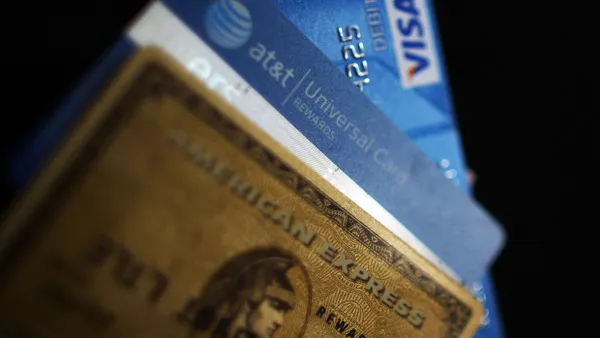Dive Brief:
- Visa operates an illegal monopoly in the market for debit card payments, and “wields its dominance, enormous scale, and centrality” to impose agreements on merchants and banks that exclude potential competitors from debit processing, the Justice Department said Tuesday in a press release announcing the filing of an antitrust lawsuit against the company. Visa handles more than 60% of U.S. debit card transactions on its network, collecting more than $7 billion annually in processing fees, according to the complaint. Mastercard is a distant second, with less than a quarter of the debit-processing market.
- Visa has struck agreements with potential competitors – including Apple, PayPal and Square – to ensure they do not develop competing products, the suit says. These deals have transformed “potential competitors into partners to the detriment of competition from those would-be rivals and Visa’s own incentives to innovate, and at the expense of American consumers and American merchants of all sizes,” the suit adds.
- The lawsuit “ignores the reality that Visa is just one of many competitors in a debit space that is growing, with entrants who are thriving,” Visa’s general counsel, Julie Rottenberg, said in an emailed statement, adding that the San Francisco-based company will “vigorously” defend itself.
Dive Insight:
Americans purchase more than $4 trillion worth of goods and services with debit cards each year, according to the complaint. Visa’s monopoly in the debit card payments market adds billions of dollars in extra fees that Americans pay when merchants increase prices to cover added costs for debit card purchases, according to the department.
“Visa’s unlawful conduct affects not just the price of one thing but the price of nearly everything,” Attorney General Merrick Garland said at a Tuesday news conference.
Millions of Americans use debit cards exclusively, eschewing credit, either because they’re unable to obtain credit or they prefer to pay immediately through their bank account, Doha Mekki, principal deputy assistant attorney general, explained at the news conference. The lawsuit makes the case that Visa’s debit business is key to its North America operation, helping generate 83% profit margins.
"We allege that to maintain this monopoly power, Visa deploys a web of unlawful anti-competitive agreements to penalize merchants and banks for using competing payment networks," Garland said at the news conference. "At the same time, it coerces would be market entrants into unlawful agreements not to compete by threatening high fees if they do not cooperate, and promising big payoffs if they do."
Visa earned more from its debit card processing business than credit cards in 2022, according to the complaint, which was filed in U.S. District Court for the Southern District of New York.
“Visa’s systematic efforts to limit competition for debit transactions have resulted in significant additional fees imposed on American consumers and businesses and slowed innovation in the debit payments ecosystem,” the department said in its complaint.
Visa is proud of its network and innovation, Rottenberg said. “When businesses and consumers choose Visa, it is because of our secure and reliable network, world-class fraud protection, and the value we provide,” she said. “We are proud of the payments network we have built, the innovation we advance, and the economic opportunity we enable.”
The Merchants Payments Coalition, a group of merchants, including retailers, convenience stores and supermarkets, said it welcomed the lawsuit.
“This is further evidence that Visa has regularly blocked competition in the debit card market,” said Doug Kantor, an executive committee member of the coalition, and the general counsel for the National Association of Convenience Stores. “Visa has relentlessly flouted the law to maintain a monopoly over setting fees for transactions made with cards issued under its brand and for processing those transactions.”
Visa has been in regulators’ and lawmakers’ cross-hairs repeatedly in recent years, including when the Justice Department sued Visa in 2020 to stop its acquisition of the digital payments technology company Plaid. In addition, Democrat Sen. Dick Durbin, who has crusaded for years to rein in Visa and Mastercard’s market dominance, has worked with Republican Sen. Roger Marshall in the past two years to pass the Credit Card Competition Act, which would require more competition for routing transactions in the credit card arena.
Durbin was instrumental in winning passage of an amendment to the 2010 Dodd-Frank Act that imposes restrictions on fees that the bank card issuers and networks can exact from merchants who process debit cards for their customers.
With its lawsuit, the Justice Department aims “to put a stop to Visa’s exclusionary and anticompetitive schemes, unfetter the markets of Visa’s unlawful monopoly, remedy the harm Visa has caused, deny Visa the fruits of its statutory violations, and prevent the recurrence of these violations of in the future,” the complaint says.
Visa shares fell about 5.5% in late afternoon trading Tuesday as Garland announced the lawsuit. The stock has gained about 17% over the past year.
Lynne Marek contributed to this story.













